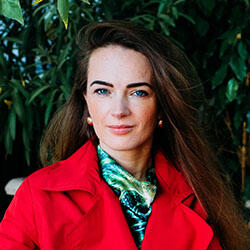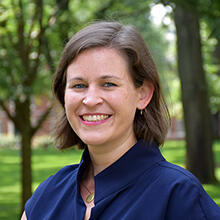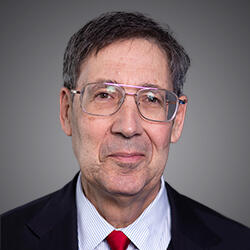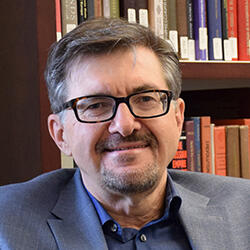Christina E. Crawford |
|
|
Dr. Christina E. Crawford is an architectural and urban historian, a trained architect, and Masse-Martin NEH Professor of Art History at Emory University. Her research focuses on the transnational exchange of ideas about housing and urban form in the twentieth century. Her first book, Spatial Revolution: Architecture and Planning in the Early Soviet Union (Cornell University Press, 2022), follows the development of socialist urban theory and practice in three seminal industrial sites: Baku, Magnitogorsk, and Kharkiv. She is co-editor of Detroit-Moscow-Detroit: An Architecture for Industrialization, 1917-1945 (MIT Press, 2023), and is currently writing a book about interwar exchanges of worker housing expertise between the U.S. and Europe using Atlanta, Georgia as a primary node. Crawford received her Ph.D. and M.Arch. from Harvard University, and her B.A. from Yale University. She was a Fulbright student in Kyiv in 2001-2002, during which she researched the emergence of post-independence Ukrainian architecture.
Twitter: @cecrawford_ |

|
Kristina Hook |
|
|
Dr. Kristina Hook is an Assistant Professor of Conflict Management at Kennesaw State University’s School of Conflict Management, Peacebuilding, and Development. She is an anthropologist and scholar-practitioner specializing in civilian protection and the prevention of genocides and mass atrocities. Hook is an expert on Ukrainian national identity formation and Ukrainian-Russian relations. A former Fulbright scholar, she has conducted multiple years of fieldwork in Ukraine since 2015 and is writing a book on the Holodomor. Her analysis has appeared in Genocide Studies and Prevention, Small Wars and Insurgencies, Bulletin of Atomic Scientists, Foreign Affairs, Atlantic Council, CNN, and USA Today. Hook received her joint PhD in anthropology and peace studies from the University of Notre Dame. Previously, she served as a U.S. Department of State policy advisor for conflict stabilization and in leadership roles with several non-governmental organizations. She is a U.S. Presidential Management Fellow alumna and a non-resident fellow at the Marine Corps University’s Krulak Center for Innovation and Future Warfare.
Twitter: @Kristina__Hook, @kennesawstate |

|
Oleksandra Matviichuk |
|
|
Oleksandra Matviichuk is a Kyiv-based human rights lawyer and civil society leader. She leads the non-profit human rights organization Center for Civil Liberties, which was awarded the Nobel Peace Award in Oslo in 2022, and also coordinates the work of the initiative group Euromaidan SOS. The activities of the Center for Civil Liberties are aimed at protecting human rights and establishing democracy in Ukraine and the OSCE region. The organization develops legislative changes, exercises public oversight over law enforcement agencies and judiciary, conducts educational activities for young people and implements international solidarity programs. Its “Tribunal for Putin” initiative has documented 27,137 war crimes committed by Russians since February 24, 2022. The Euromaidan SOS initiative was created in response to the brutal dispersal of a peaceful student rally in Kyiv on November 30, 2013. During the Revolution of Dignity, several thousand volunteers provided round-the-clock legal and other aid to persecuted people throughout the country. Since the end of the protests and beginning of Russian aggression in Ukraine, the initiative has been monitoring political persecution in occupied Crimea, documenting war crimes and crimes against humanity during the hybrid war in the Donbas, and conducting the “LetMyPeopleGo” international campaign to release political prisoners detained by the Russian authorities. Matviichuk has experience in creating horizontal structures for massive involvement of people in human rights activities against attacks on rights and freedoms, as well as a multi-year practice of documenting violations during armed conflict. She is the author of a number of alternative reports to various UN bodies, the Council of Europe, the European Union, the OSCE and the International Criminal Court. In 2016, she received the Democracy Defender Award for "Exclusive Contribution to Promoting Democracy and Human Rights" from missions to the OSCE. She received the 2017 Ukraine’s Woman of Courage Award from U.S. Ambassador to Ukraine Marie L. Yovanovitch, the Hillary Rodham Clinton Award, and the 2022 Right Livelihood Award. Matviichuk was named one of the top 25 most influential women in the world by The Financial Times. Twitter: @avalaina |

|
Tamila Tasheva |
|
|
Tamila Tasheva was appointed in April 2022 by President Zelensky to the position of Permanent Representative of the President of Ukraine in the Autonomous Republic of Crimea, previously serving as the Deputy Permanent Representative. The Mission of the President of Ukraine in Crimea headed by Tamila Tasheva performs the functions of the Office of the Crimean Platform. Currently, the Office is working on tasks related to the first steps after de-occupation, particularly issues of responsibility (amnesty, lustration, etc.), property rights, personnel reserve, and citizenship. The team has also developed a strategy for the economic recovery of Crimea after de-occupation. Tasheva is a co-founder and long-term coordinator of CrimeaSOS, one of the most effective human rights organizations in Ukraine dealing with the topic of temporarily occupied Crimea. She is a human rights activist and one of the Crimean Tatar young generation leaders. Tasheva has been actively involved in IDP issues, the human rights situation in Crimea, advocacy activities, and the development of the Ukrainian social protection legislation and international humanitarian law regarding the temporarily occupied territories. She also has broad experience in the civil society sector, with a special emphasis on culture and education. In 2019, Tasheva was awarded the state award of the Order of Princess Olga 3rd degree and the Polish Sergio Vieira de Mello Award. Facebook: Representative of the President to Crimea / Tamila Tasheva |

|



















